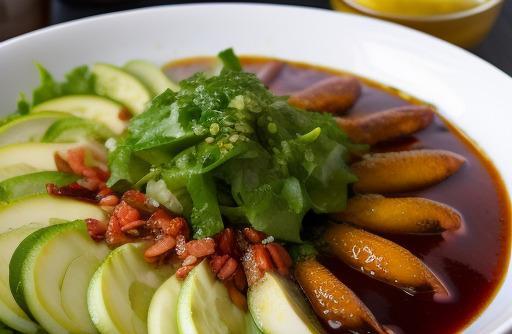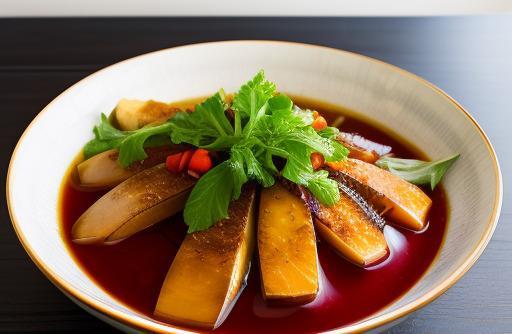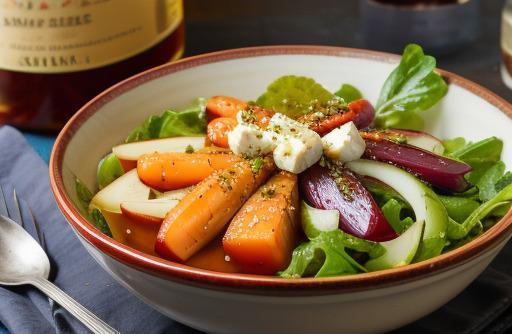Best Substitutes For Red Wine Vinegar In Baking

Red wine vinegar is a tangy and flavorful ingredient that is commonly used in baking. It adds acidity and helps in activating leavening agents, resulting in a light and fluffy texture in baked goods. However, there may be times when you find yourself in need of a substitute for red wine vinegar in your baking recipes. Whether you’ve run out of red wine vinegar or are looking for a non-alcoholic alternative, there are several options available that can impart a similar flavor profile and acidity to your baked goods.
In this article, we will explore the best substitutes for red wine vinegar in baking, how to choose the right substitute, and provide some delicious recipes that utilize these alternatives.
Key Takeaways
- Red wine vinegar adds acidity and flavor to baked goods.
- When substituting red wine vinegar in baking, it’s important to consider the acidity and flavor profile of the substitute.
- Apple cider vinegar, white wine vinegar, and balsamic vinegar are great alternatives to red wine vinegar in baking.
- Lemon juice, lime juice, and rice vinegar can also be used in certain recipes.
- Use half the amount of vinegar called for in the recipe when using lemon or lime juice as a substitute.
Why You Need A Substitute For Red Wine Vinegar In Baking
There can be several reasons why you may need a substitute for red wine vinegar in baking. Here are a few common scenarios:
-
You’ve run out of red wine vinegar: Sometimes, you may realize you don’t have red wine vinegar on hand while in the middle of a baking project. It’s helpful to have alternative options available in such situations.
-
You want a non-alcoholic substitute: Red wine vinegar is made from fermented red wine, meaning it contains alcohol. If you are avoiding alcohol in your baking, it’s useful to have non-alcoholic alternatives on hand.
-
Flavor preferences: While red wine vinegar imparts a rich flavor to baked goods, some people may not enjoy its pronounced taste. Substituting it with another vinegar or acidic ingredient can provide a milder flavor profile.
Types Of Substitutes For Red Wine Vinegar In Baking

When choosing a substitute for red wine vinegar in baking, it’s important to consider the acidity and flavor profile of the alternative. Here are some of the commonly used substitutes:
-
Apple Cider Vinegar: Apple cider vinegar is an excellent alternative to red wine vinegar in baking. It has a similar level of acidity and adds a subtly fruity flavor to baked goods. Use it in a 1:1 ratio as a replacement for red wine vinegar.
-
White Wine Vinegar: If you are looking for a less fruity substitute, white wine vinegar is a great option. It has a milder flavor compared to red wine vinegar. Use it in the same quantity as the recipe calls for red wine vinegar.
-
Balsamic Vinegar: Balsamic vinegar can add a rich and tangy flavor to your baked goods. It is slightly sweeter than red wine vinegar, so reduce the amount by 25% when using it as a substitute.
-
Lemon Juice: Lemon juice provides a bright and refreshing flavor to your baking. It is especially suited for recipes that benefit from a citrusy kick. Use half the amount of lemon juice as the recipe calls for red wine vinegar.
-
Lime Juice: Similar to lemon juice, lime juice can provide a citrusy twist to your baked goods. It works well in recipes that require a tropical or tangy flavor. Like lemon juice, use half the amount of lime juice as a substitute for red wine vinegar.
-
Rice Vinegar: Rice vinegar is commonly used in Asian cuisine and can be used as a substitute for red wine vinegar in certain baking recipes, especially those with an Asian flavor profile. Use the same amount of rice vinegar as the recipe calls for red wine vinegar.
Best Substitutes For Red Wine Vinegar In Baking

Now that we know the different types of substitutes for red wine vinegar, let’s take a closer look at the best options available:
-
Apple Cider Vinegar: This versatile vinegar works well in a wide range of baking recipes. Its fruity flavor complements both sweet and savory dishes. Use it in equal amounts as a substitute for red wine vinegar.
-
White Wine Vinegar: White wine vinegar has a milder taste compared to red wine vinegar, making it suitable for those who prefer a more subtle flavor. Use it as a 1:1 replacement in your baking recipes.
-
Balsamic Vinegar: If you’re looking to add depth and richness to your baked goods, balsamic vinegar is an excellent choice. However, remember to reduce the amount by 25% when using it as a substitute for red wine vinegar.
-
Lemon Juice: Lemon juice is a refreshing and tangy alternative to red wine vinegar. It works best in recipes that benefit from a citrusy flavor. Use half the amount of lemon juice as the recipe suggests for red wine vinegar.
-
Lime Juice: Lime juice provides a zesty and tropical twist to your baking. It pairs well with recipes that require a hint of tanginess. Like lemon juice, use half the amount of lime juice as a replacement for red wine vinegar.
-
Rice Vinegar: Rice vinegar lends a slightly sweet and mild flavor to baked goods. It is commonly used in Asian cooking and can be a suitable substitute for red wine vinegar in recipes with an Asian flavor profile.
Choosing The Right Substitute For Red Wine Vinegar In Baking

When selecting a substitute for red wine vinegar in baking, it’s crucial to consider the acidity and flavor profile of the alternative. Here are some tips for choosing the right substitute:
-
Consider the acidity: Red wine vinegar has a moderate level of acidity, so it’s important to select a substitute that provides a similar level of acidity to ensure the proper balance in your baked goods.
-
Pair with the flavor profile: Each substitute imparts a unique flavor profile. Consider the overall taste of your dish and select a substitute that complements the other ingredients.
-
Adjust the quantity: Depending on the substitute you choose, you may need to adjust the quantity to achieve the desired flavor. Some substitutes may require using a smaller amount, while others may require increasing or decreasing the quantity.
-
Experiment and taste test: If you are unsure about the flavor and acidity of your chosen substitute, try a small amount in your recipe and taste test it before proceeding with the full quantity. This will help you determine if the substitute works well in your specific recipe.
-
Keep in mind the color: It’s important to note that certain substitutes like balsamic vinegar or dark apple cider vinegar can darken the color of your baked goods. If the appearance is a concern, opt for a substitute that maintains the desired color of your dish.
Pro Tip:
When using lemon or lime juice as a substitute for red wine vinegar, add a pinch of sugar to balance the acidity and enhance the flavor.
Cooking With Substitutes For Red Wine Vinegar In Baking

When using substitutes for red wine vinegar in baking, here are some considerations to keep in mind:
-
Acidity balance: Since red wine vinegar adds acidity to your recipes, it’s important to note that the substitute you choose should provide a similar level of acidity. This is particularly crucial when working with leavening agents like baking soda or baking powder. The acidity helps activate these agents, so using the right substitute ensures proper leavening.
-
Flavor adjustment: Substitutes for red wine vinegar may have a slightly different flavor profile. As a result, you may need to adjust other ingredients in your recipe accordingly. Taste test as you go and make any necessary adjustments to ensure the desired flavor.
-
Texture impact: Red wine vinegar helps in tenderizing baked goods like cakes and cookies. While the substitutes mentioned can provide similar acidity, they may not have the same tenderizing effect. To compensate, you can consider using alternative techniques such as using buttermilk or adding a bit of yogurt to maintain the desired texture.
-
Color consideration: Certain substitutes like balsamic vinegar and dark apple cider vinegar can darken the color of your baked goods. If the appearance is an important aspect of your recipe, choose a substitute that doesn’t significantly alter the final color.
Recipes Using Substitutes For Red Wine Vinegar In Baking

Now that you have a better understanding of the substitutes for red wine vinegar in baking, here are a few delicious recipes that showcase these alternatives:
1. Apple Cider Vinegar Chocolate Cake
Ingredients:
- 2 cups all-purpose flour
- 1 3/4 cups granulated sugar
- 3/4 cup unsweetened cocoa powder
- 1 1/2 teaspoons baking powder
- 1 1/2 teaspoons baking soda
- 1 teaspoon salt
- 2 large eggs
- 1 cup whole milk
- 1/2 cup vegetable oil
- 2 teaspoons vanilla extract
- 1 cup hot water
- 2 tablespoons apple cider vinegar
Instructions:
- Preheat the oven to 350°F (175°C) and grease and flour a 9×13-inch baking dish.
- In a large mixing bowl, whisk together the flour, sugar, cocoa powder, baking powder, baking soda, and salt.
- Add the eggs, milk, vegetable oil, and vanilla extract to the dry ingredients. Mix until well combined.
- Gradually add the hot water while stirring continuously to avoid lumps.
- Stir in the apple cider vinegar until fully incorporated.
- Pour the batter into the prepared baking dish and smooth the top.
- Bake for 35-40 minutes or until a toothpick inserted into the center comes out clean.
- Let the cake cool completely before frosting or serving.
2. Lemon Poppy Seed Muffins
Ingredients:
- 2 cups all-purpose flour
- 1 cup granulated sugar
- 2 teaspoons baking powder
- 1/2 teaspoon baking soda
- 1/4 teaspoon salt
- 1/2 cup unsalted butter, melted
- 3/4 cup buttermilk
- 2 large eggs
- 2 tablespoons freshly squeezed lemon juice
- 2 teaspoons lemon zest
- 1 tablespoon poppy seeds
- 1 teaspoon vanilla extract
- 1 tablespoon lemon extract (optional)
- 1 tablespoon white wine vinegar
Instructions:
- Preheat the oven to 375°F (190°C) and line a muffin tin with paper liners.
- In a large mixing bowl, combine the flour, sugar, baking powder, baking soda, and salt.
- In a separate bowl, whisk together the melted butter, buttermilk, eggs, lemon juice, lemon zest, poppy seeds, vanilla extract, lemon extract (if using), and white wine vinegar.
- Pour the wet ingredients into the dry ingredients and gently fold until just combined. Do not overmix.
- Divide the batter evenly among the muffin cups, filling them about 2/3 full.
- Bake for 18-20 minutes or until a toothpick inserted into the center comes out clean.
- Remove the muffins from the tin and let them cool on a wire rack before serving.
Storage And Shelf Life Of Substitutes
The storage and shelf life of substitutes for red wine vinegar will vary depending on the specific substitute you choose. Here are some general guidelines:
-
Apple Cider Vinegar: Store apple cider vinegar in a cool and dark place, away from direct sunlight. It has a long shelf life of about 2-5 years when unopened and can last indefinitely when refrigerated after opening.
-
White Wine Vinegar: Like apple cider vinegar, white wine vinegar should be stored in a cool and dark place. It has a shelf life of about 2-3 years when unopened and can last indefinitely when refrigerated after opening.
-
Balsamic Vinegar: Store balsamic vinegar in a cool and dark place. Properly stored, it can last indefinitely. However, over time, the flavor can change, so it’s best to use it within a few years.
-
Lemon Juice and Lime Juice: Freshly squeezed lemon and lime juice can be stored in the refrigerator for up to 1 week. To extend their shelf life, you can freeze the juice in ice cube trays and store the cubes in an airtight container for up to 3 months.
-
Rice Vinegar: Store rice vinegar in a cool and dark place. It has a shelf life of about 2-3 years when unopened and can last indefinitely when refrigerated after opening.
Always check the expiration dates and follow the storage instructions provided on the packaging for the specific substitute you are using.
Conclusion
While red wine vinegar adds a distinct flavor to baked goods, there are several substitutes available that can provide a similar level of acidity and flavor profile. Apple cider vinegar, white wine vinegar, balsamic vinegar, lemon juice, lime juice, and rice vinegar are all excellent alternatives depending on your preferences and the specific recipe you are working with. By understanding the characteristics of each substitute and considering factors such as acidity, flavor profile, and color impact, you can confidently choose the right substitute for red wine vinegar in your baking endeavors. So, the next time you find yourself in need of a replacement for red wine vinegar, don’t worry – you now have a variety of options to choose from that will help you achieve delicious results in your baked goods.
FAQS
What Can Be Used Instead Of Red Wine Vinegar For Baking?
There are several substitutes that you can use in place of red wine vinegar for baking. These include white wine vinegar, apple cider vinegar, rice vinegar, balsamic vinegar, and lemon or lime juice.
Can White Wine Vinegar Be Used As A Substitute For Red Wine Vinegar In Baking?
Yes, white wine vinegar can be used as a substitute for red wine vinegar in baking. It has a similar acidity level and flavor, though it may be slightly milder.
How Does Apple Cider Vinegar Compare To Red Wine Vinegar For Baking?
Apple cider vinegar is a good substitute for red wine vinegar in baking as it has a similar acidity level and can provide a slightly fruity flavor that complements many baked goods.
Can Balsamic Vinegar Be Used Instead Of Red Wine Vinegar For Baking?
Yes, balsamic vinegar can be used as a substitute for red wine vinegar in baking. However, its strong and distinct flavor may not be suitable for all recipes.
Is Lemon Or Lime Juice A Good Substitute For Red Wine Vinegar In Baking?
Lemon or lime juice can be used as a substitute for red wine vinegar in baking, especially for recipes that require only a small amount of vinegar. However, their acidic flavor may not be appropriate for all baked goods.
Sources
About the Author Jenny
I'm Jenny, a housewife with an unwavering passion for food. My culinary journey began with my grandmother's kitchen, and it's now a full-fledged food blog. I've turned my love for cooking into a creative outlet, sharing recipes and stories with a global community of fellow food enthusiasts. It's proof that being a housewife can also mean pursuing your passions and savoring life's delectable moments.
